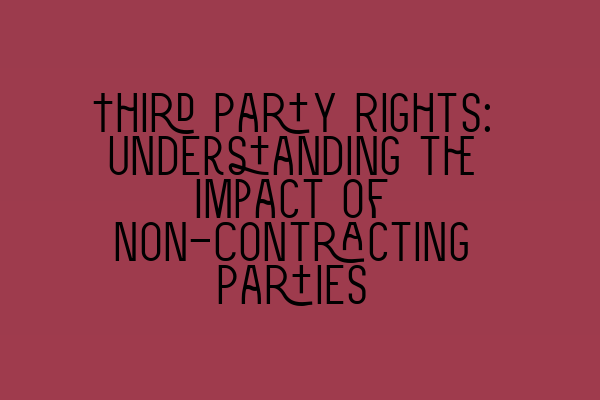As a solicitor with expertise in contract law, it is essential to understand the impact of third-party rights on contractual agreements. In many business transactions, it is common for non-contracting parties to be affected by the terms and conditions of a contract. This can have significant implications for all parties involved, and it is crucial to navigate these complexities effectively.
What are Third Party Rights?
Third party rights refer to the legal rights and obligations that non-contracting parties acquire in relation to a contract. These rights can arise in various situations, such as contracts that confer benefits or impose obligations on parties who are not signatories to the agreement. It is important to note that third-party rights can be both express or implied, and they can have a substantial impact on the parties involved.
To better understand the significance of third-party rights, let’s explore some key aspects and their potential implications:
1. Beneficiary Rights
One common scenario where third-party rights come into play is when a contract includes provisions that directly benefit a non-contracting party. This is known as a beneficiary right. In such cases, the non-contracting party can enforce these rights against the contracting parties if the contract is breached. It is crucial for the contracting parties to be aware of these beneficiary rights and ensure they fulfill their obligations to avoid potential legal disputes.
2. Assignment of Rights
Another important aspect of third-party rights is the assignment of contractual rights. Assignment allows a contracting party to transfer their rights under the contract to a third party. This means that the third party can step into the shoes of the original contracting party and enforce those rights. However, it is essential to carefully review the terms of the contract to determine if such assignments are permitted or restricted. Failure to comply with assignment provisions can result in the invalidation or limitation of third-party rights.
SQE 1 Practice Mocks FLK1 FLK2
3. Privity of Contract
In the past, common law principles restricted third-party rights under contracts. The doctrine of privity of contract meant that only the contracting parties had legal rights and obligations. However, this has evolved over time, and certain exceptions have been introduced to protect the interests of third parties. This shift is particularly evident in consumer contracts, where legislation grants consumers the ability to enforce their rights against manufacturers or suppliers directly.
The Implications of Third Party Rights
Understanding the implications of third-party rights is essential for solicitors and contracting parties. Failure to consider these rights can lead to legal disputes and potential financial liabilities. Here are some key considerations:
1. Contractual Interpretation
When drafting or reviewing contracts, it is vital to consider the potential impact on third parties. Clear and unambiguous language should be used to identify any specified beneficiaries or parties with the ability to enforce rights. Without proper drafting, there may be ambiguity, causing uncertainty and the potential for costly litigation.
2. Risk Assessment and Due Diligence
Before entering into a contract, it is crucial to conduct thorough due diligence to identify any potential third-party rights that may be impacted. This involves reviewing relevant legislation, existing contracts, industry practices, and any other factors that may influence the rights and obligations of non-contracting parties.
3. Dispute Resolution
In the event of a breach of contract, the involvement of third-party rights can complicate dispute resolution. A thorough understanding of the applicable law, contract provisions, and relevant case law is essential to effectively navigate these complexities and protect the interests of all parties involved.
Conclusion
In conclusion, the impact of third-party rights on contractual agreements cannot be underestimated. As a solicitor, it is crucial to have a comprehensive understanding of these rights and their implications. By recognizing and addressing potential issues related to third-party rights, solicitors can help their clients avoid legal disputes, ensure compliance with contractual obligations, and protect the interests of all parties involved.
